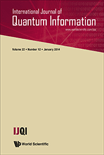
INTERNATIONAL JOURNAL OF QUANTUM INFORMATION
Scope & Guideline
Unraveling the Mysteries of Quantum Computation and Cryptography
Introduction
Aims and Scopes
- Quantum Information Theory:
The journal emphasizes research on the theoretical underpinnings of quantum information, including quantum entropy, capacity of quantum channels, and quantum coding theory. - Quantum Algorithms and Computation:
A significant focus is on the development and analysis of quantum algorithms, including implementations on quantum computers and the exploration of quantum complexity classes. - Quantum Communication Protocols:
Research on secure communication methods, such as quantum key distribution and multi-party protocols, is a core area, reflecting the journal's commitment to practical applications of quantum information. - Entanglement and Quantum Correlations:
The study of entanglement, its characterization, and its implications for quantum information processes is frequently featured, highlighting the importance of quantum correlations. - Quantum Technologies and Applications:
The journal also covers emerging technologies that utilize quantum principles, such as quantum sensing, quantum imaging, and quantum machine learning, indicating a trend towards practical applications. - Interdisciplinary Approaches:
Research that intersects quantum information with other fields, such as finance, biology, and machine learning, showcases the journal's commitment to broadening the impact of quantum information research.
Trending and Emerging
- Quantum Machine Learning:
There has been a notable increase in research at the intersection of quantum computing and machine learning, highlighting the potential of quantum algorithms to enhance data processing and analysis. - Quantum Cryptography and Security:
The focus on advanced quantum cryptographic protocols, including multi-party and relay-assisted schemes, has grown, indicating a heightened interest in secure communication in quantum networks. - Quantum Neural Networks and Hybrid Systems:
Emerging studies on quantum neural networks and hybrid quantum-classical systems showcase innovative approaches to leveraging quantum mechanics in artificial intelligence and machine learning. - Decoherence and Error Correction:
Research on strategies to mitigate decoherence and improve error correction in quantum systems is increasingly prominent, reflecting the challenges of practical quantum computing. - Quantum Technologies in Real-World Applications:
An uptick in papers discussing the applications of quantum technologies, particularly in fields like finance and telecommunications, suggests a trend towards practical implementations of quantum information.
Declining or Waning
- Classical vs. Quantum Comparisons:
Papers that primarily compare classical and quantum systems have become less frequent, possibly indicating a saturation of foundational comparisons as the field matures. - Basic Quantum Mechanics:
Research focusing solely on introductory or basic quantum mechanics concepts appears to be waning, as the journal transitions towards more complex and applied quantum information topics. - Quantum Games and Game Theory:
Studies specifically dealing with quantum versions of classical game theory have seen a reduction, suggesting a shift towards more practical applications of quantum information rather than theoretical constructs. - Historical Analyses of Quantum Theory:
The exploration of historical perspectives on quantum theory, while still relevant, has decreased, indicating a preference for forward-looking research that addresses contemporary challenges in quantum information.
Similar Journals

Quantum Information Processing
Pioneering research in quantum algorithms and cryptography.Quantum Information Processing, published by Springer, stands as a pivotal journal within the rapidly evolving field of quantum computing and information science. With an ISSN of 1570-0755 and an E-ISSN of 1573-1332, this journal has been a vital resource since its inception in 2004 and is set to continue contributing until 2024. Ranked in Q2 for Electrical and Electronic Engineering, Electronic, Optical and Magnetic Materials, and various other categories, its high visibility in academic circles is reinforced by its Scopus rankings, showcasing its integral role in advancing theoretical and practical aspects of quantum technologies. Although it operates under a subscription model, Quantum Information Processing prioritizes accessibility to groundbreaking research that covers a wide spectrum of topics, including quantum algorithms, quantum cryptography, and quantum error correction, making it essential reading for researchers, professionals, and students alike. As the field grows, the journal remains committed to fostering innovation and collaboration among scholars, ensuring its position as an influential platform for sharing pivotal advancements in quantum information theory and applications.

AVS Quantum Science
Fostering Collaboration in Quantum DiscoveryAVS Quantum Science, published by AIP Publishing, is a premier open-access journal dedicated to the interdisciplinary realm of quantum science, encompassing advancements in atomic and molecular physics, computational theory, and materials science. With an impressive array of contributions from researchers worldwide, this journal has achieved a remarkable status in the academic community, proudly holding a Q1 category ranking across multiple fields including Condensed Matter Physics and Electrical and Electronic Engineering as of 2023. As an essential resource for scholars, practitioners, and students, AVS Quantum Science emphasizes the critical importance of quantum phenomena in shaping future technologies and methodologies. The journal's commitment to rigorous peer review and dissemination of groundbreaking research serves as a pivotal platform for innovation, revealing new insights and fostering collaboration in the evolving landscape of quantum science.
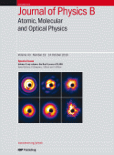
JOURNAL OF PHYSICS B-ATOMIC MOLECULAR AND OPTICAL PHYSICS
Exploring the Frontiers of Atomic and Molecular PhysicsJOURNAL OF PHYSICS B-ATOMIC MOLECULAR AND OPTICAL PHYSICS, published by IOP Publishing Ltd, stands as a key platform within the fields of atomic, molecular, and optical physics. With an impressive history spanning from 1988 to 2024, this journal is recognized for its high-quality research contributions, holding a Q2 ranking in both Atomic and Molecular Physics and Optics, and Condensed Matter Physics, as of 2023. While not an open-access journal, it continues to attract a broad readership and submissions due to its commitment to disseminating knowledge that is at the forefront of contemporary physics research. The journal's ISSN 0953-4075 and E-ISSN 1361-6455 signal its accessibility and relevance in academic discourse. As researchers, professionals, and students delve into the intricate phenomena of quantum mechanics and photonics, they will find pivotal studies and insights within these pages, reinforcing JOURNAL OF PHYSICS B's stature as an esteemed resource in the ever-evolving landscape of physics.
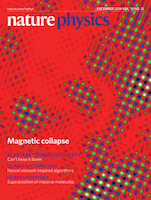
Nature Physics
Transforming Theoretical Insights into Practical ApplicationsNature Physics is a premier journal dedicated to publishing high-impact research in the realm of physics, brought to you by the esteemed NATURE PORTFOLIO. With its ISSN 1745-2473 and E-ISSN 1745-2481, this journal has established itself as a vital resource for the physics community, enjoying a remarkable Q1 quartile ranking in the Physics and Astronomy category for 2023 and securing an impressive Rank #5/243 and a 98th percentile ranking in Scopus. Since its inception in 2005, Nature Physics has become a catalyst for innovation, featuring cutting-edge research that encompasses a broad spectrum of physics disciplines. Although it operates under traditional subscription models, it maintains a commitment to accessibility through selective publications and editorial excellence. Positioned in Berlin, Germany, this journal is a must-read for researchers, professionals, and students who seek to stay at the forefront of advancements in physics.

Science China-Information Sciences
Advancing the Frontiers of Information Sciences.Science China-Information Sciences is a prestigious academic journal published by SCIENCE PRESS, dedicated to advancing knowledge in the field of information sciences and computer science. Established in China, the journal has gained a remarkable reputation, with a 2023 category quartile ranking of Q1 in Computer Science (miscellaneous) and an impressive Scopus rank of #16 out of 232 in General Computer Science, positioning it within the 93rd percentile. The journal embraces a broad spectrum of topics, from theoretical frameworks to practical applications, providing a platform for researchers, professionals, and students to disseminate their findings and engage with the latest advancements in the field. With open access options available, Science China-Information Sciences ensures that innovative research is accessible to a global audience, fostering collaboration and interdisciplinary dialogue. The journal not only reflects the evolving landscape of information sciences but also plays a pivotal role in shaping future research directions.
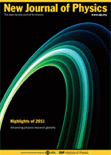
NEW JOURNAL OF PHYSICS
Innovating ideas, illuminating the world of physics.NEW JOURNAL OF PHYSICS, published by IOP Publishing Ltd, is a prestigious open-access journal that has been at the forefront of the physics community since its inception in 1998. With an impact factor that places it in the Q1 category of Physics and Astronomy (miscellaneous) and a commendable ranking of #49 out of 243 in the general physics and astronomy category according to Scopus, this journal is recognized for its significant contribution to advancing research in the field. The journal caters to a broad scope of topics, providing a platform for the dissemination of cutting-edge research findings and innovative theoretical explorations. Operating from the United Kingdom, it offers a truly international perspective, making its contents accessible and impactful to a global audience. With robust open-access options, the NEW JOURNAL OF PHYSICS ensures that research findings are freely available, promoting collaboration and knowledge sharing among researchers, professionals, and students alike. This commitment to accessibility, combined with its high-quality content, makes it an essential resource for anyone engaged in the physics community.
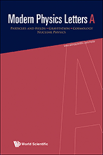
MODERN PHYSICS LETTERS A
Pioneering Discoveries in Modern PhysicsMODERN PHYSICS LETTERS A, published by World Scientific Publishing Co Pte Ltd, is a distinguished journal in the field of physics that serves as a pivotal platform for researchers, professionals, and students alike. With ISSN 0217-7323 and E-ISSN 1793-6632, the journal has gained international acclaim for its contributions to Astronomy and Astrophysics as well as Nuclear and High Energy Physics. The journal is ranked in Q3 for both Astronomy and Astrophysics and Nuclear and High Energy Physics, showcasing its relevance in these areas, while also achieving a Q2 ranking in the broader category of Physics and Astronomy (miscellaneous). Spanning from 1996 to 2024, MODERN PHYSICS LETTERS A promotes open dialogue and dissemination of pioneering research findings and innovative theories. While the journal operates without an open access option, its rich content is easily accessible through various academic databases, ensuring that vital research is shared widely among the scientific community. Situated in Singapore, this journal plays an essential role in the continuous advancement of the physics discipline, fostering collaboration and knowledge sharing among global researchers.
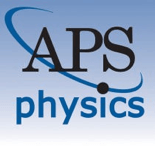
PHYSICAL REVIEW A
Advancing Knowledge in Optics and PhotonicsPHYSICAL REVIEW A, published by the American Physical Society, is a leading journal in the field of Atomic and Molecular Physics and Optics, boasting a Q1 category ranking in its area for 2023. With an ISSN of 2469-9926 and an E-ISSN of 2469-9934, this journal plays a pivotal role in disseminating high-quality research findings, theories, and methodologies that shape current understanding and advancements in the discipline. Although not an open-access journal, it remains highly accessible to professionals and academia through institutional subscriptions. The journal's impactful contributions are evident from its Scopus rank of #70 out of 224 in the field, placing it in the 68th percentile for scholarly impact. As a hub of innovative research and a vital resource for both students and seasoned researchers alike, PHYSICAL REVIEW A remains essential for those seeking to stay abreast of breakthroughs in atomic and molecular studies, as well as optics and photonics.
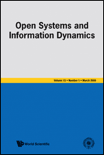
OPEN SYSTEMS & INFORMATION DYNAMICS
Connecting Disciplines: Where Mechanics Meets Information Dynamics.OPEN SYSTEMS & INFORMATION DYNAMICS, published by World Scientific Publishing Co Pte Ltd, is a leading international journal dedicated to advancing research in the interdisciplinary areas of computational mechanics, information systems, and mathematical physics. With its ISSN 1230-1612 and E-ISSN 1793-7191, the journal has established itself as an influential platform for disseminating original research findings, reviews, and methodologies that address complex systems and dynamics. Its current impact factor reflects a solid reputation within the academic community, particularly amongst researchers in the fields of physics, statistics, and computational sciences. The journal's scope encompasses a diverse array of subjects, earning a Q2 classification in Computational Mechanics and Q3 in multiple other categories, including Fluid Flow and Transfer Processes and Information Systems. By providing open access to a wealth of knowledge, OPEN SYSTEMS & INFORMATION DYNAMICS is committed to fostering collaboration and innovation for students, researchers, and industry professionals alike, positioning itself as a cornerstone of scientific exploration and discovery in Singapore and beyond.

EPJ Quantum Technology
Pioneering Research in Quantum Technology and BeyondEPJ Quantum Technology is a prestigious open-access journal published by Springer, dedicated to advancing the fields of Quantum Technology, with a focus on areas such as atomic and molecular physics, condensed matter physics, and control engineering. Launched in 2014, this journal has quickly established itself as an influential platform for scholars and practitioners, achieving a remarkable Q1 ranking across multiple categories in 2023, indicative of its high impact and relevance in the scientific community. With an impressive Scopus ranking that places it in the top 15% for condensed matter physics and the top 20% for electrical and electronic engineering, EPJ Quantum Technology serves as a vital resource for researchers aiming to explore groundbreaking technologies and foster interdisciplinary collaboration. By providing unrestricted access to cutting-edge research, it plays a crucial role in disseminating knowledge that drives innovation and enhances understanding in this rapidly evolving field. Based in Germany and reaching an international audience, it is poised to impact the future of quantum science and technology significantly.